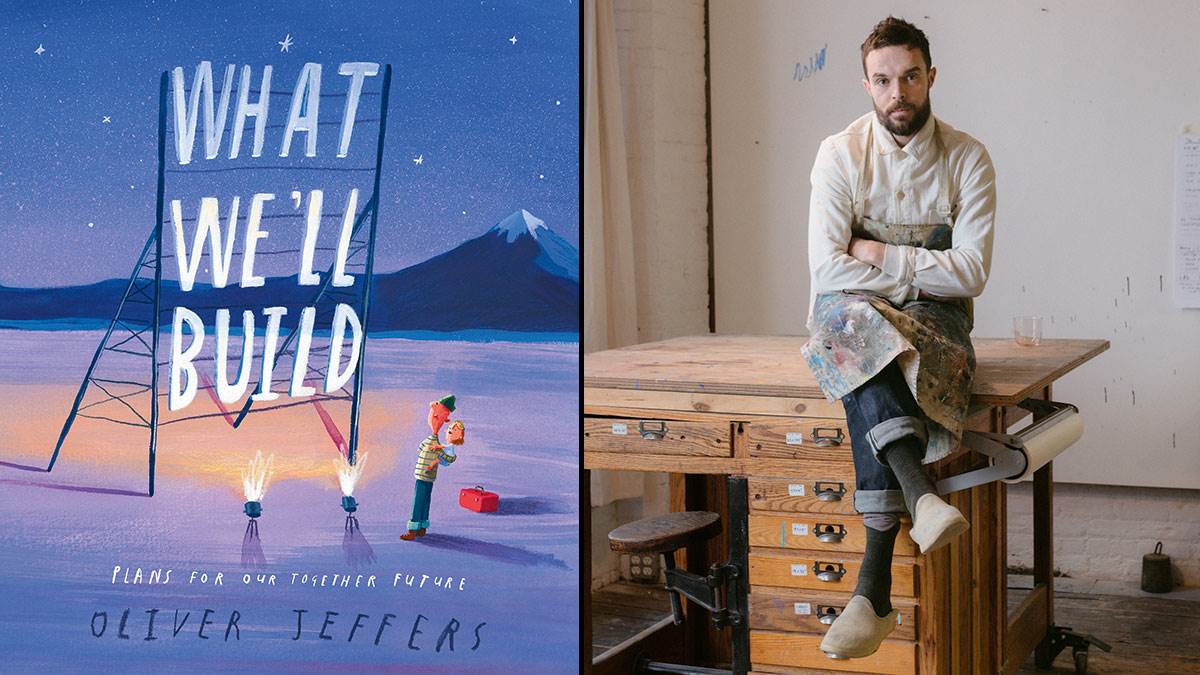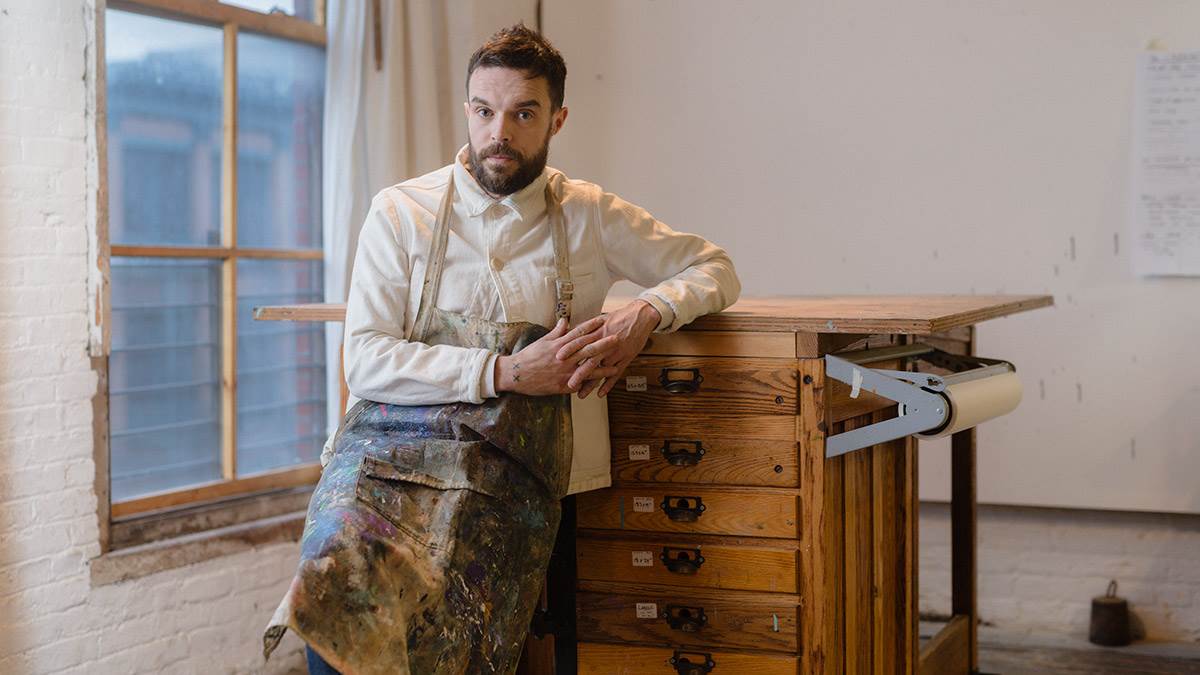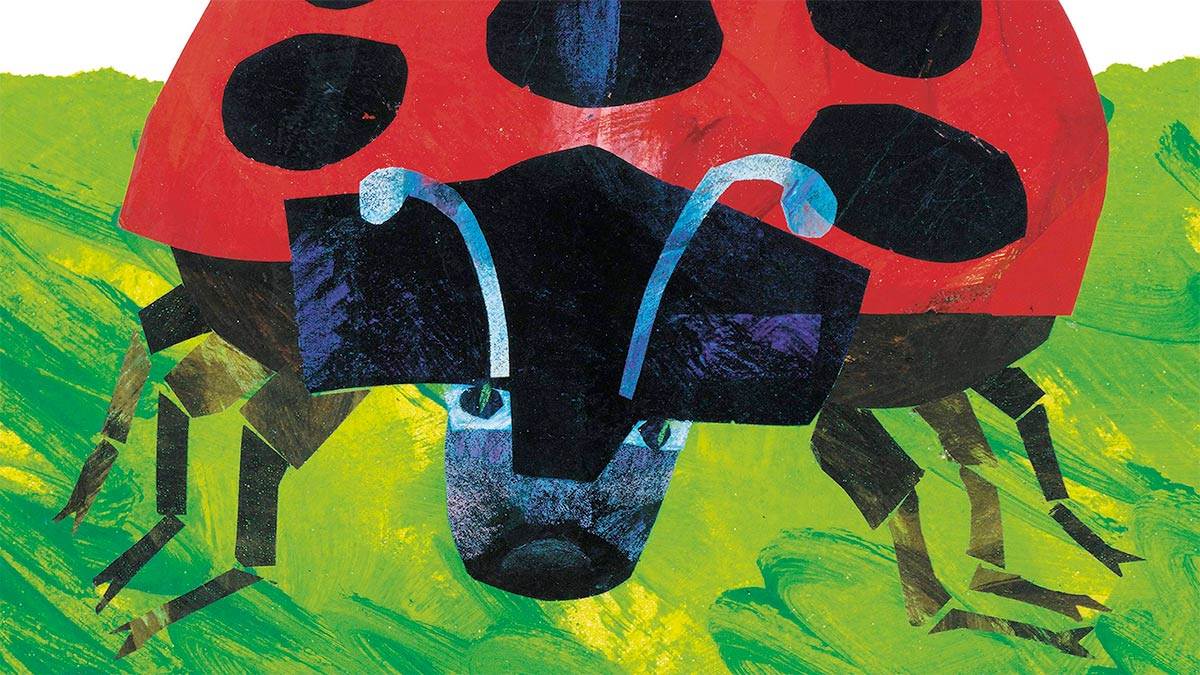'The path isn’t always going to be smooth and rosy': Oliver Jeffers on preparing children for the world
Published on: 4 Tachwedd 2020 Author: Anna McKerrow
Oliver Jeffers' new book What We'll Build is a beautiful tale of a father and daughter laying the foundations for their future together.
We spoke to Oliver about writing the book for his own daughter and how he's preparing his two children for the world...

Photo © Caroline Tompkins
You wrote your new book What We'll Build for your daughter, and your previous book Here We Are: Notes for living on Planet Earth for your son. What are the messages you wanted to convey in these books – to your own children and to readers?
With Here We Are it was the paradigm shift of being a parent for the very first time and the magnitude of how that affects an individual: just the notion of bringing this tiny ball of life home from the hospital.
It began as comedy as I was giving him a tour of the apartment – I was explaining things he clearly couldn't understand. But then that comedy morphed to drama as the magnitude and weight of that responsibility started to reveal itself, so the words I was saying to him were somewhat funny, but also I was just pointing out the really obvious things about what it is to be alive on this planet in the 21st century.
Originally it was intended to be a letter to him, but as the world was becoming an angrier and more frightening place, with the rise of right-wing politics and xenophobia and nationality and immigration all becoming issues, all the things I was writing about in the book seemed good reminders of what it is to be a good human being – not only for me, but for everyone, really.
So if Here We Are was a book about trying to understand the world the way it is, What We'll Build is about looking forward to our future and how you change that world.
I do joke that I'd never hear the end of it if my daughter didn't get a book and my son did. But the truth is that I was having these moments of self-reflection when she was born, about what it is to have a daughter. She's the first female Jeffers to be born in something like four generations.
With the second child, the obvious is spelled out already about what it is to be a parent, so this was about contemplating this whole future relationship we were going to have. I'm always the sort of person who has to verbalise their plans, even though nobody's really listening: it just helps. So this sort of started out like that, and it became a poem. It's about the space between any two loving people and about planning for their future.
The path isn't always going to be smooth and rosy: there's dark times, and in those dark times you have to remember what it is that drives you forward: the love that bonds you to each other.

Photo © Caroline Tompkins
Here We Are and What We'll Build are both such poignant books for parents, because they really do say exactly what you want to tell your children about the world. I like that What We'll Build talks about building walls to keep others out, because that's your fear as a parent – you want to protect your children from everything bad in the world. But later in the book, you build a campfire to share warmth with some of the characters that might have felt like enemies before. Can you talk about that a little?
It's the door that invites people in. Nothing is rigid. Nothing is static, stationary or square. The idea that you come from a particular country has always seemed (pun intended) foreign to me. The boundaries of nationalism are hard and sharp and uninviting, whereas culture is warm and inviting and it's about celebration rather than about us versus them.
So I think it's important moment in that book that, yes, I do build the wall, but the most important part of that wall is the door, then the characters saying sorry, me too, me three and listening to other people around the campfire.
These books are very much meditations on being a parent as well as looking ahead to the future of our children. What is the hardest – or scariest - thing about being a parent, and what do you find is the most joyful?
The scariest thing is not knowing what to do - you know the classic line, they don't come with a manual. I once heard somebody say that you don't raise children, you raise adults, and I've always liked that.
They're just so precious and fragile and need protecting, but they also need to be taught how to live in a world that can be rough and frightening, unfair and unjust. So how do you best prepare them for that while retaining the simple joy that they have?
It's also hard adjusting to the schedule of children when it comes to work. Making anything is about being in the moment, but now with childcare and school and all the routines we have, I have to be a lot more rigid in the way in which I use my time.
The joyful part is watching them grow and becoming who they are. Watching them learn things and put things together, and watching their joys and interests and their sense of humour come out.
I like the DIY theme of What We'll Build, especially as a book for a daughter.
Ha! We were moving into a temporary apartment and I had a red toolbox just like the one in the book, and every time I opened it, she'd be over like a flash.
Well, tools are very exciting! Do you have plans to teach your daughter DIY – especially in a future where we might aim to reuse, repair and recycle more?
Absolutely! My wife's father is wonderful with woodworking and he's got a great tool shed, and I think that might be my son's favourite place on earth. Mari is still a bit little but she likes to go in and bang things, but they'll both be learning, definitely. Rather than replace: repair.

What were some of your favourite books as a child?
I loved The Bad Tempered Ladybird by Eric Carle. For some reason I loved the notion of this increasing size. The book felt like a magic object because when it's the whale and then it folds out, the whale just seems so enormous, but when you put those pages away and close the book and put it on your bookshelf, that book was the same size as any other book.
It was only years later, in art college probably, that I realised it was because you could see the ladybird beside the whale, so it was that sense of scale and perspective that made you feel you were being let in on a magician's trick.
Do you think that book influenced you in any way?
I didn't realise it at the time, but I think it was a big influence on the pattern of story in my book Stuck: in terms of the increasingly larger objects I used in the story.
Do your children have any favourite books right now? What are they?
My son is into anything with diggers or pirates. I think because Mari's book is coming out, he's also going through a little resurgence of enjoying Here We Are. My daughter's favourite book is probably A Bit Lost by Chris Haughton!
Topics: Picture book, Interview, Features





Add a comment